- What is an FAQ chatbot?
- How does an FAQ chatbot work?
- Why use FAQ Chatbots?
- Types of FAQ chatbots
- What to look for when choosing a FAQ Chatbot?
- Implementing FAQ chatbots in different industries
- Challenges and limitations of FAQ chatbots
- Best practices for implementing FAQ Chatbots
- Future trends and developments in FAQ chatbots
- Wrapping up
Are you tired of customers coming to you with the same questions? Do you feel that your call center agents are losing precious time responding to such calls?
Using FAQ chatbots to automate customer service can help you avoid the frustration of answering repetitive questions. In addition, these nifty virtual assistants can deliver many e-commerce benefits as well, including better sales and customer lifetime value, thereby keeping your teams and leadership happy.
With FAQ chatbots fielding routine queries on your website and customer-facing applications, you can hope to meet burgeoning customer demands and deliver instant support round-the-clock.
This is just one of the ways FAQ chatbots are transforming customer support landscapes across industries. In this article, you will learn all about their varied use cases and applications and how you can leverage them effectively to answer some of your most common business problems.
Let's get started.
What is an FAQ chatbot?
An FAQ chatbot is an AI-powered virtual assistant that automates customer support by addressing frequently asked questions independently. With a user-friendly interface that typically comprises questions formulated as clickable buttons, these chatbots are able to detect a user's pain point and point them toward the resolution in a few clicks.
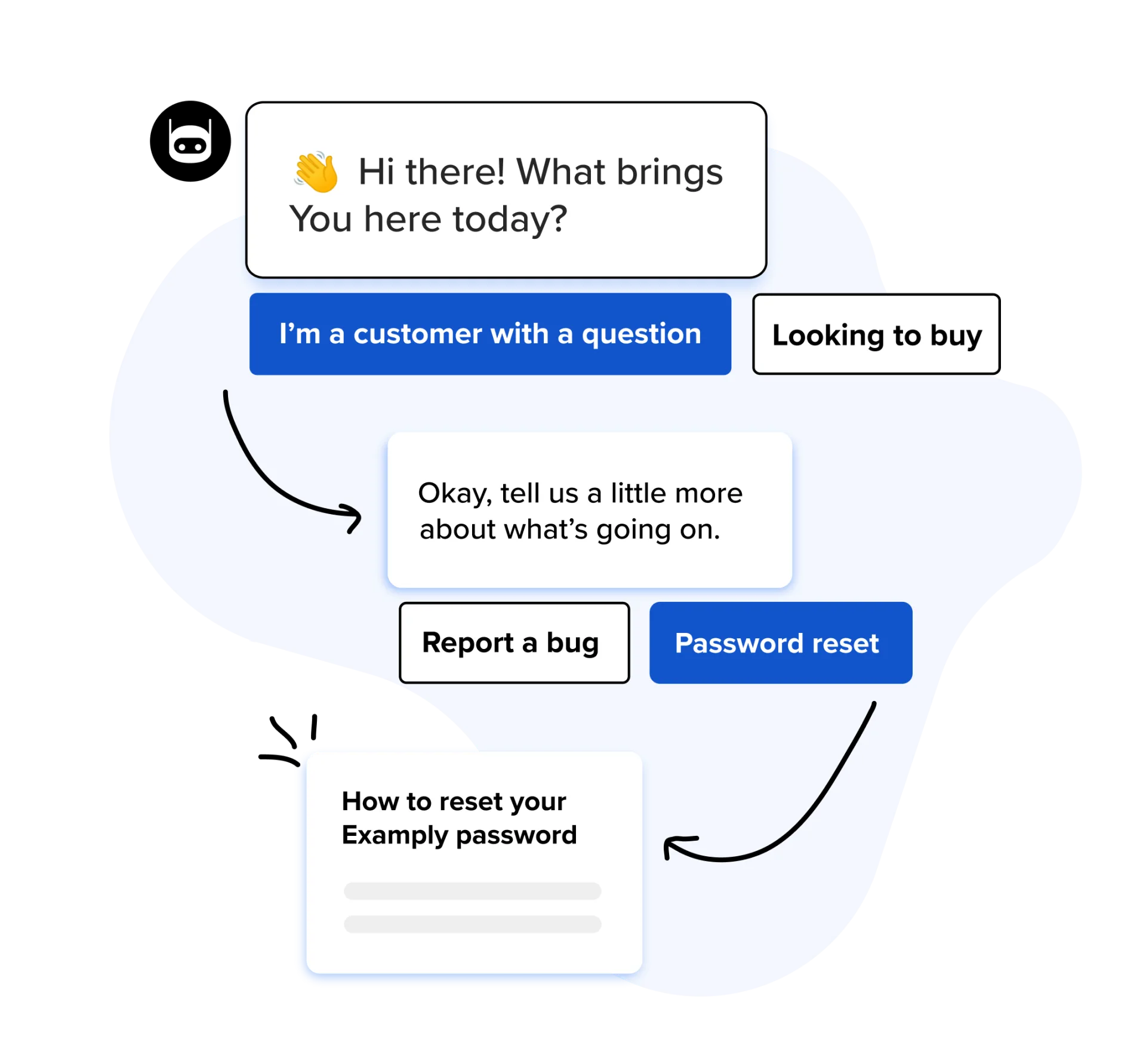
However, FAQ chatbots are not devoid of shortcomings. Being a nascent technology, their programming leaves something to be desired when it comes to complex problem-solving that is not covered in their internal database of questions.
Some sophisticated FAQ chatbots that are based on natural language programming (NLP) and text analysis are able to understand a user's intent even if they type questions in a manner different from how it appears in the bot's internal knowledge base. Consequently, they are able to give relevant answers/recommendations that boost your customer satisfaction (CSAT).
FAQ chatbots can be embedded in all your customer-facing touchpoints, including websites, apps, and social media platforms like Facebook and Instagram.
How does an FAQ chatbot work?
FAQ chatbots work by employing NLP algorithms to analyze user queries, identify the intent behind the question and retrieve relevant answers from a pre-built knowledge base. They use techniques such as keyword matching, intent classification and entity recognition to understand user inputs.
Example: Let's say a customer in an online store has a shipping-related question. Instead of asking them to wait for agent support, they can be directed to an FAQ chatbot. The chatbot verifies the user's identity, understands their issue, and surfaces relevant answers from its internal database. It draws on the user's historical data to gain more context about the user and their journey with the brand, which helps with response personalization - a sure-fire way of winning the trust of discerning customers.
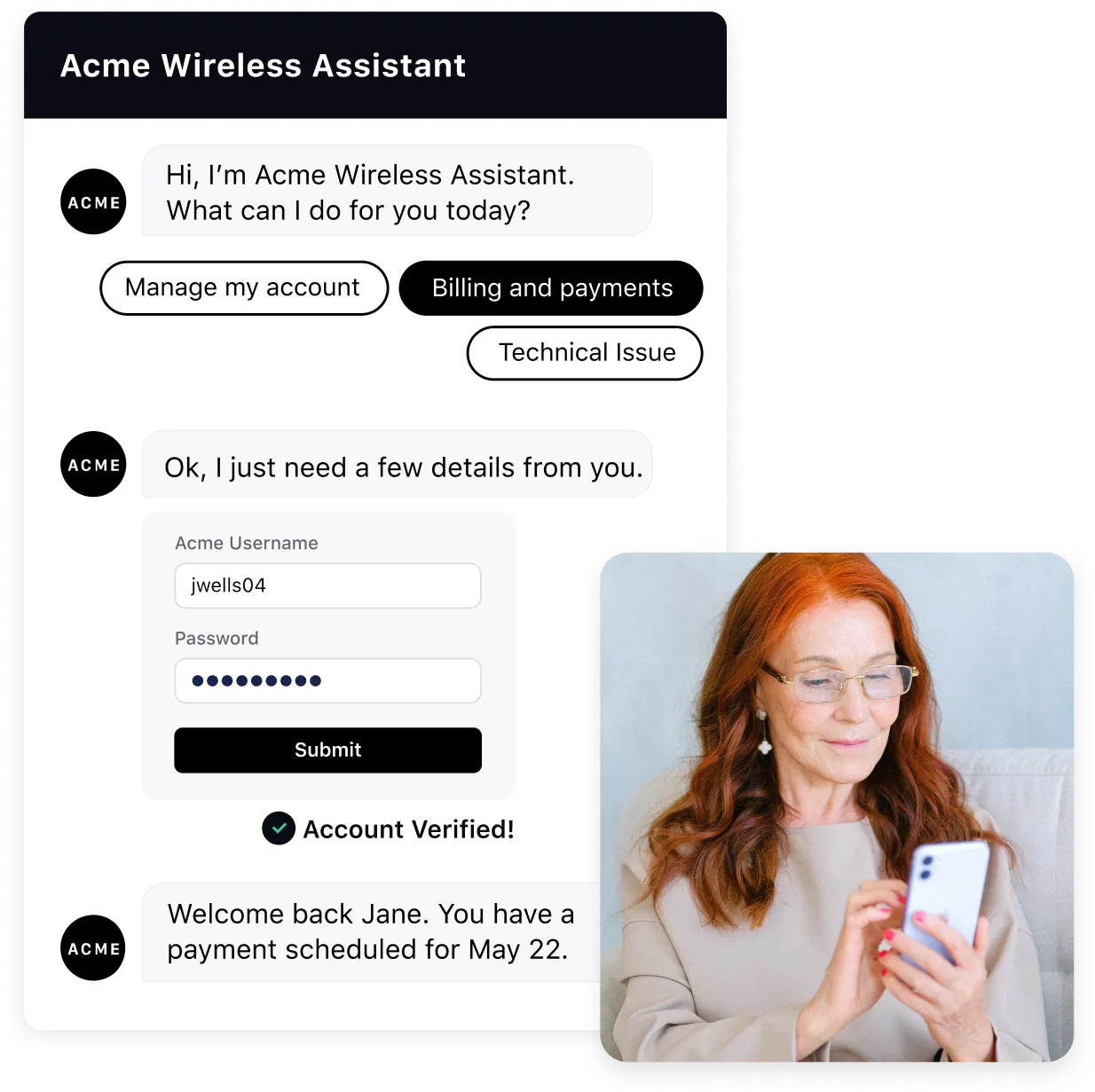
Once the issue is resolved, the FAQ bot presents the user with a quick customer survey to evaluate its response quality and improve incrementally with every interaction.
Why use FAQ Chatbots?
Having a chatbot to answer repetitive questions offers several advantages to businesses, customers and agents alike, with increased office productivity being a major one.
Let's explore other compelling reasons for getting an FAQ chatbot for your business.
1. Improved customer experience and satisfaction
FAQ chatbots provide instant and accurate responses, eliminating the need for customers to wait for human support. This improves customer satisfaction by resolving queries promptly and efficiently.
Read more: Improve customer experience using AI-powered chatbots
2. 24/7 availability and instant response time
FAQ bots are available round-the-clock, providing support to customers at any time. Consumers prefer to use chatbots because they provide instant responses. Their instant response time ensures that users receive assistance without delay, enhancing the overall customer experience.
3. Cost-effectiveness and efficiency in customer support
By automating routine queries, FAQ bots reduce the workload on human support agents. This leads to cost savings for businesses and enables support teams to focus on more complex issues that require human intervention.
4. Reduction in human errors and consistent brand voice
FAQ chatbots deliver consistent responses based on the information available in their knowledge base. It minimizes the risk of human errors and ensures uniformity in support interactions.
Types of FAQ chatbots
FAQ chatbots come in various forms, each tailored to meet specific business needs and customer preferences. Understanding the different types of FAQ chatbots can help businesses choose the most suitable solution for their requirements.
Here are some common types of FAQ chatbots:
1. Rule-based chatbots
Rule-based chatbots, also known as scripted chatbots, follow a predefined set of rules and decision trees. They operate based on a fixed knowledge base, where answers to frequently asked questions are pre-programmed.
Rule-based chatbots work well for businesses with straightforward and predictable customer queries. However, they may struggle with handling complex or ambiguous questions that fall outside their predefined rules.
2. Conversational AI
Conversational AI is a smart technology that lets you talk to a computer system as you talk to a person. It uses advanced computer skills to understand and respond to you naturally.
In customer service, this technology helps companies have lifelike conversations with customers without needing a human agent to be there. It makes the experience more relevant and realistic.
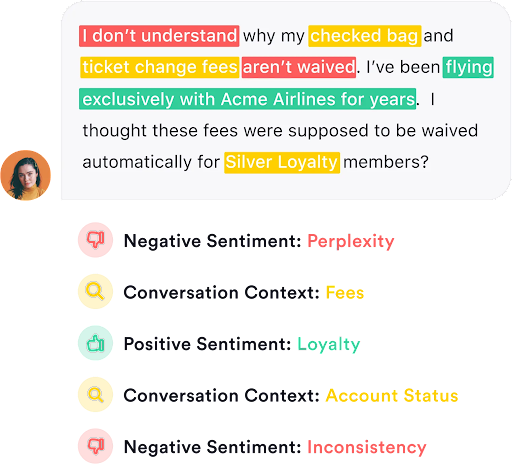
Sephora was one of the first retailers to roll out a conversational AI bot. The bot manages customer inquiries and requests about store reservations for makeovers, makeup tips, how-to videos, reviews and more.
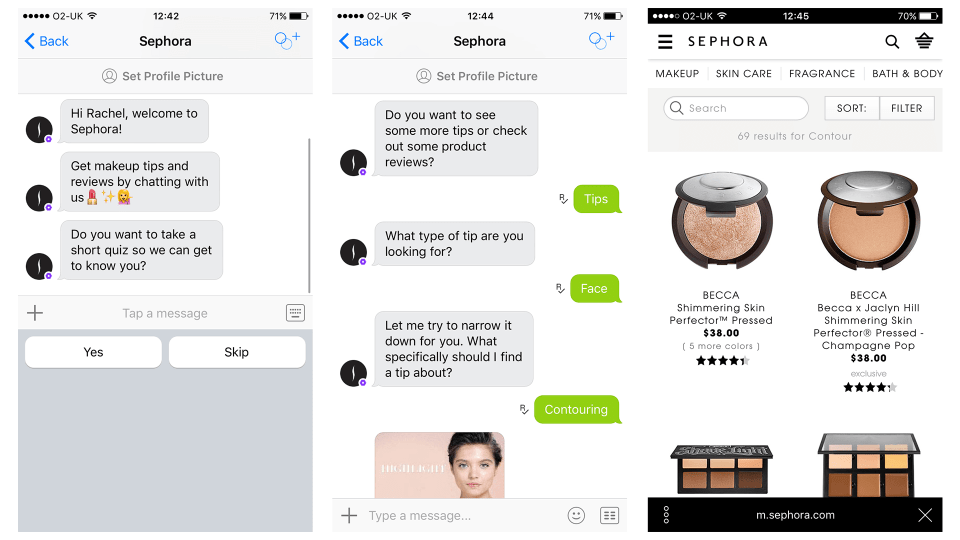
Learn more: How Conversational AI helps brands be human@scale
3. Hybrid chatbots
Hybrid chatbots combine the strengths of rule-based, retrieval-based and generative chatbots. They use a hybrid approach to handle different types of queries.
Hybrid chatbots utilize predefined rules and decision trees for common queries, retrieval-based methods for matching similar questions and generative techniques for handling more complex or unique inquiries.
This type of chatbot offers flexibility and can provide accurate responses across various query types.
What to look for when choosing a FAQ Chatbot?
Selecting the right FAQ chatbot for your business is crucial to ensure seamless customer support and optimal results. Here are some key factors to consider when choosing a FAQ chatbot:
1. Customization and flexibility
The chatbot should be customizable to align with your brand's voice and specific requirements. Look for a chatbot platform that allows easy customization of the conversational flow, user interface and visual design.
2. Integration capabilities
Consider the integration capabilities of the chatbot with your existing systems and platforms. It should seamlessly integrate with your website, messaging apps, CRM systems or any other customer touchpoints.
AkzoNobel UK faced challenges with a fragmented social presence, especially with managing over 60+ accounts across various channels. This led to longer response times and customer dissatisfaction. A Unified-CXM platform helped them provide proactive support across six social channels, 19 accounts and six brands. Care agents contributed £13,000 ($18,500) in recommendations, engagements increased by 172% and response times reduced by 80%. The insights from this platform enabled quick resolution of customer inquiries, enhancing overall customer satisfaction.
3. Scalability and performance
Ensure that the chatbot can handle high volumes of customer queries without compromising on performance. Look for a chatbot solution that can handle peak traffic and provide fast response times to maintain a positive user experience.
4. Cost-effectiveness
Evaluate the pricing structure and cost-effectiveness of the chatbot solution. Consider factors such as licensing fees, implementation costs, ongoing maintenance expenses and potential scalability charges.
Implementing FAQ chatbots in different industries
FAQ chatbots can be implemented across various industries, including eCommerce, Retail, Software as a Service (SaaS), Banking, Financial Services and Insurance (BFSI).
1. eCommerce
In the fast-paced world of online shopping, chatbots can assist customers with product inquiries, order tracking and returns.
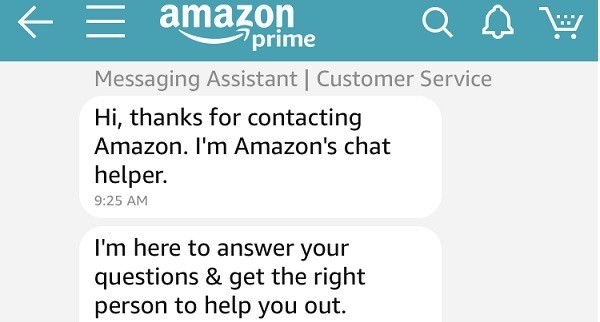
Source
An excellent example is Amazon's customer support chatbot which assists customers with order tracking and product inquiries, providing instant and accurate responses.
2. Retail
FAQ chatbots have proven to be valuable assets for the retail sector. They can help customers find products, provide personalized recommendations and offer assistance with in-store or online purchases.
Sephora's chatbot helps customers find products, provides beauty tips and assists with appointment bookings, enhancing the shopping experience.
3. Software as a service (SaaS) industry
In the SaaS industry, FAQ chatbots can offer valuable support to users navigating complex software platforms. They can address common queries related to product features, troubleshooting and account management.
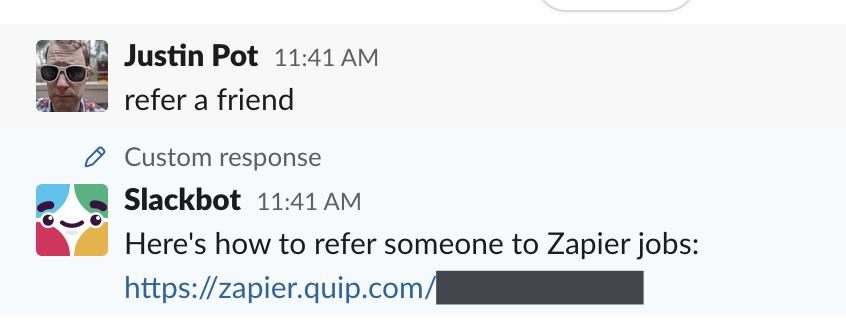
Source
Slack, a popular collaboration platform, use Slackbot, a chatbot that guides users on using the platform and answers frequently asked questions about its functionalities.
4. BFSI
The BFSI sector deals with a multitude of customer inquiries, ranging from account balances to loan applications. FAQ chatbots can efficiently handle these queries, providing instant responses and guiding customers through various financial processes.
Bank of America's chatbot, Erica, offers personalized banking assistance, helping customers with transactions, account information and financial advice.
Interested to learn more? Read chatbots are being used for brands in 2023
Challenges and limitations of FAQ chatbots
While FAQ chatbots offer numerous benefits, they also come with their fair share of challenges and limitations. Understanding and addressing these challenges is crucial for businesses to deploy effectively and optimize their chatbot solutions. Here are some of the common challenges and limitations associated with FAQ chatbots:
1. Handling complex or ambiguous queries: FAQ chatbots are designed to respond based on pre-defined knowledge, making them less effective in handling complex or ambiguous queries that require contextual understanding or subjective judgment.
2. Language and cultural limitations: FAQ bots may face challenges in understanding queries in different languages or dialects. Training the chatbot with diverse language data and continuous improvement can help mitigate these limitations.
3. Balancing automation and human intervention: While FAQ chatbots aim to automate customer support, there are instances where human intervention is necessary. Finding the right balance between automation and human involvement is crucial to ensure a seamless customer experience.
4. Continuous improvement and updates: FAQ bots require regular updates to their knowledge base to ensure the accuracy and relevance of responses. The dynamic nature of business operations and evolving customer queries necessitate ongoing monitoring and refinement of the chatbot's performance.
Best practices for implementing FAQ Chatbots
By following best practices, businesses can leverage the full potential of chatbot technology and provide seamless customer support. Here are some key best practices to consider when implementing FAQ chatbots:
Tip 1: Draft clear and concise responses
Craft responses that are easy to understand and provide relevant information without unnecessary complexity. Use conversational language and avoid jargon or technical terms that may confuse users.
Tip 2: Refine the chatbot's performance by constant testing
Thoroughly test the chatbot's interactions to identify any gaps or issues. Conduct user testing to gather feedback and refine the chatbot's responses based on real user experiences.
Tip 3: Monitor and analyze user interactions
Continuously monitor the chatbot's performance by analyzing user interactions. Track metrics such as user satisfaction, response accuracy and conversation completion rates to identify areas for improvement and make data-driven enhancements.
Learn more: Best practices to be followed for building an efficient chatbot
Future trends and developments in FAQ chatbots
1. Integration with voice assistants and smart devices: FAQ chatbots will likely be integrated with voice-based virtual assistants like Siri, Google Assistant and Alexa, enabling users to access information and support through voice commands.
2. Advancements in natural language understanding and generation: AI technologies will continue to advance, enhancing the chatbot's ability to understand complex queries, interpret user intent and generate more human-like responses.
3. Personalization and context-aware chatbot interactions: FAQ bots will leverage user data to personalize responses based on individual preferences and past interactions, delivering tailored support experiences.
4. Ethical considerations and transparency: As chatbots become more prevalent, matters such as data privacy, algorithmic bias and transparency in interactions will require more attention.
Wrapping up
FAQ chatbots offer immense potential in automating customer support and streamlining information retrieval. They provide quick and accurate answers to frequently asked questions, saving time and enhancing customer experience.
That said, FAQ bots may face limitations with complex queries. This is where advanced AI chatbots come into play, leveraging technologies like NLP and machine learning to handle a wider range of inquiries. Integrating solutions like AI chatbots can significantly improve customer interactions and boost operational efficiency.
Platforms like Sprinklr offer a comprehensive suite of tools and technologies, including AI chatbots, to optimize customer interactions and streamline operations. Businesses can harness the power of AI chatbots to handle customer queries efficiently, improve response times and ultimately elevate customer satisfaction. Explore Sprinklr Service offerings today and unlock the potential for enhanced customer experiences in your organization.
Book a demo today and elevate your customer support!
Frequently Asked Questions
While chatbots can handle routine queries efficiently, they may not fully replace human agents as complex or sensitive issues often require human empathy and problem-solving skills.
Thank you for contacting us.
A Sprinklr representative will be in touch with you shortly.
Contact us today, and we'll create a customized proposal that addresses your unique business needs.
Request a Demo
Welcome Back,
No need to fill out any forms — you're all set.


